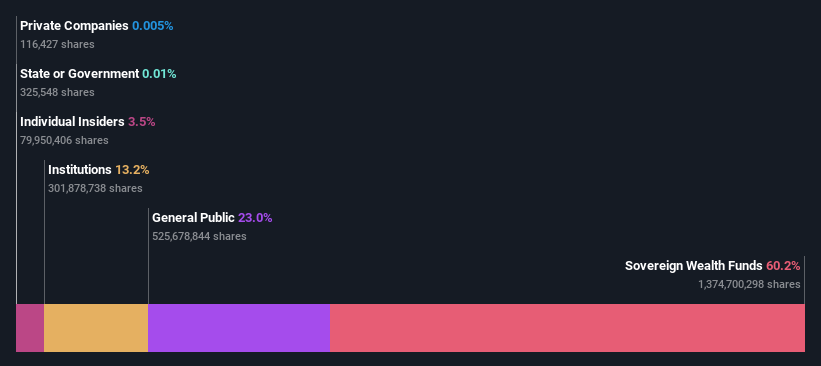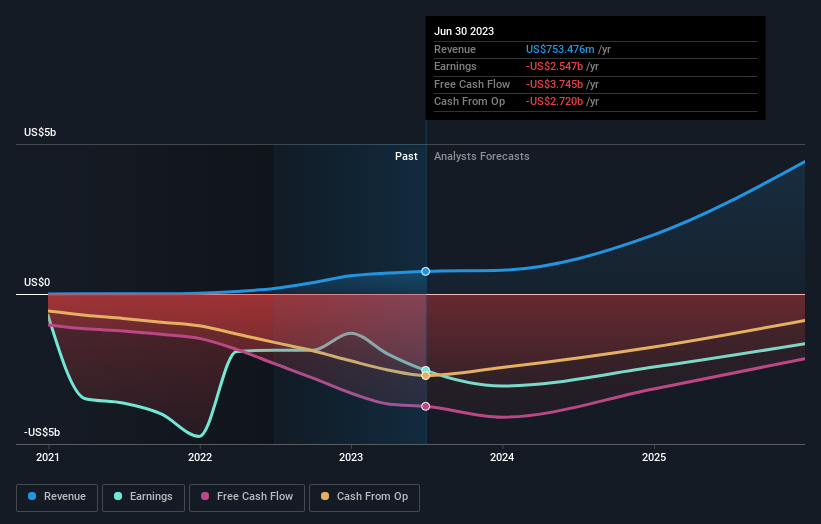- United States
- /
- Auto
- /
- NasdaqGS:LCID
Lucid Group, Inc.'s (NASDAQ:LCID) biggest owners are sovereign wealth funds who got richer after stock soared 9.0% last week
Key Insights
- Significant control over Lucid Group by sovereign wealth funds implies that the general public has more power to influence management and governance-related decisions
- Public Investment Fund owns 60% of the company
- Insiders have been selling lately
A look at the shareholders of Lucid Group, Inc. (NASDAQ:LCID) can tell us which group is most powerful. And the group that holds the biggest piece of the pie are sovereign wealth funds with 60% ownership. In other words, the group stands to gain the most (or lose the most) from their investment into the company.
Clearly, sovereign wealth funds benefitted the most after the company's market cap rose by US$1.1b last week.
Let's take a closer look to see what the different types of shareholders can tell us about Lucid Group.
View our latest analysis for Lucid Group

What Does The Institutional Ownership Tell Us About Lucid Group?
Institutional investors commonly compare their own returns to the returns of a commonly followed index. So they generally do consider buying larger companies that are included in the relevant benchmark index.
We can see that Lucid Group does have institutional investors; and they hold a good portion of the company's stock. This implies the analysts working for those institutions have looked at the stock and they like it. But just like anyone else, they could be wrong. It is not uncommon to see a big share price drop if two large institutional investors try to sell out of a stock at the same time. So it is worth checking the past earnings trajectory of Lucid Group, (below). Of course, keep in mind that there are other factors to consider, too.

Hedge funds don't have many shares in Lucid Group. Public Investment Fund is currently the largest shareholder, with 60% of shares outstanding. This essentially means that they have extensive influence, if not outright control, over the future of the corporation. The Vanguard Group, Inc. is the second largest shareholder owning 3.2% of common stock, and Michael Klein holds about 2.3% of the company stock.
While it makes sense to study institutional ownership data for a company, it also makes sense to study analyst sentiments to know which way the wind is blowing. There are plenty of analysts covering the stock, so it might be worth seeing what they are forecasting, too.
Insider Ownership Of Lucid Group
While the precise definition of an insider can be subjective, almost everyone considers board members to be insiders. The company management answer to the board and the latter should represent the interests of shareholders. Notably, sometimes top-level managers are on the board themselves.
I generally consider insider ownership to be a good thing. However, on some occasions it makes it more difficult for other shareholders to hold the board accountable for decisions.
Our most recent data indicates that insiders own some shares in Lucid Group, Inc.. It is a very large company, and board members collectively own US$447m worth of shares (at current prices). Most would say this shows a good alignment of interests between shareholders and the board. Still, it might be worth checking if those insiders have been selling.
General Public Ownership
With a 23% ownership, the general public, mostly comprising of individual investors, have some degree of sway over Lucid Group. While this group can't necessarily call the shots, it can certainly have a real influence on how the company is run.
Next Steps:
While it is well worth considering the different groups that own a company, there are other factors that are even more important. Consider risks, for instance. Every company has them, and we've spotted 2 warning signs for Lucid Group you should know about.
Ultimately the future is most important. You can access this free report on analyst forecasts for the company.
NB: Figures in this article are calculated using data from the last twelve months, which refer to the 12-month period ending on the last date of the month the financial statement is dated. This may not be consistent with full year annual report figures.
New: AI Stock Screener & Alerts
Our new AI Stock Screener scans the market every day to uncover opportunities.
• Dividend Powerhouses (3%+ Yield)
• Undervalued Small Caps with Insider Buying
• High growth Tech and AI Companies
Or build your own from over 50 metrics.
Have feedback on this article? Concerned about the content? Get in touch with us directly. Alternatively, email editorial-team (at) simplywallst.com.
This article by Simply Wall St is general in nature. We provide commentary based on historical data and analyst forecasts only using an unbiased methodology and our articles are not intended to be financial advice. It does not constitute a recommendation to buy or sell any stock, and does not take account of your objectives, or your financial situation. We aim to bring you long-term focused analysis driven by fundamental data. Note that our analysis may not factor in the latest price-sensitive company announcements or qualitative material. Simply Wall St has no position in any stocks mentioned.
About NasdaqGS:LCID
Lucid Group
A technology company, designs, engineers, manufactures, and sells electric vehicles (EV), EV powertrains, and battery systems.
Flawless balance sheet with low risk.
Similar Companies
Market Insights
Community Narratives




